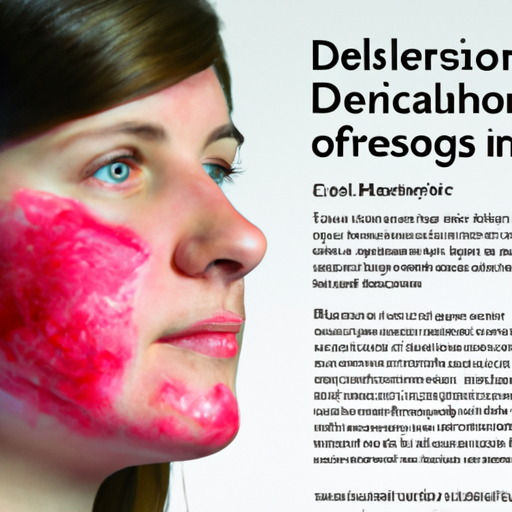Have you ever wondered if your glorious beard can do more than just enhance your appearance? Well, today we’re going to explore the fascinating topic of whether a beard can actually protect you from harmful UV rays. UV rays from the sun can cause skin damage, premature aging, and even skin cancer. It’s important to take sun protection seriously, and if your beard can provide an extra layer of defense, that would be pretty awesome, right?
In our upcoming article, we’ll dive into the science behind UV radiation and its effects on the skin. We’ll explore whether a thick, bushy beard can act as a natural sunscreen, shielding your face from those harmful rays. We’ll also discuss the factors that may influence the level of sun protection your beard can provide, such as the length, density, and color of your facial hair.
But wait, there’s more! We’ll also provide you with practical tips on how to maximize the potential sun protection of your beard and educate you on the importance of using other forms of sun protection, such as sunscreen and hats, to ensure you’re fully safeguarded when spending time outdoors. So stay tuned and get ready to learn all there is to know about whether your beard can truly protect you from UV rays.

The Science Behind UV Rays and Their Effects on the Skin
Understanding UV Rays
UV rays are a type of electromagnetic radiation emitted by the sun. There are three types of UV rays – UVA, UVB, and UVC. UVC rays are absorbed by the Earth’s atmosphere and do not reach the surface. UVA rays, also known as aging rays, penetrate deep into the skin and are responsible for wrinkles and skin aging. UVB rays, on the other hand, are the primary cause of sunburns and are also linked to the development of skin cancer.
How UV Rays Affect the Skin
When UV rays come into contact with our skin, they can cause damage to the DNA within our skin cells. This damage can lead to mutations and the development of skin cancer over time. UV rays can also weaken the immune system, making it harder for the body to fight off infections and diseases.
Excessive exposure to UV rays can also cause premature aging of the skin, leading to the development of wrinkles, fine lines, and age spots. UV rays can break down collagen and elastin, which are proteins responsible for maintaining the skin’s elasticity and firmness.
The Role of Sunscreen in UV Protection
Sunscreen is a crucial tool in protecting the skin from the harmful effects of UV rays. It works by either absorbing or reflecting UV radiation, preventing it from penetrating the skin. Sunscreen contains active ingredients that can either be organic (chemical) or inorganic (physical).
Organic sunscreen ingredients, such as avobenzone and octinoxate, absorb UV radiation and convert it into heat, which is then released from the skin. Inorganic sunscreen ingredients, like zinc oxide and titanium dioxide, act as a physical barrier and reflect UV radiation away from the skin.
It is recommended to use a broad-spectrum sunscreen that protects against both UVA and UVB rays. Additionally, sunscreen should have a sun protection factor (SPF) of 30 or higher for adequate protection. It is important to apply sunscreen generously and reapply every two hours or after swimming or sweating.
The Role of Hair in Protecting the Skin from UV Rays
The Function of Hair in the Body
Hair serves several functions in the human body. It helps regulate body temperature by providing insulation, and it also serves as a sensory organ, allowing us to detect changes in our environment. Additionally, hair can act as a protective barrier, shielding the skin from external factors such as UV radiation and harmful pollutants.
Can Hair Provide UV Protection?
Hair can provide some level of UV protection, but its effectiveness depends on various factors, such as hair color, thickness, density, and length. While hair can block some UV rays from reaching the skin, it is not a foolproof method of protection and should not be relied upon solely for UV protection.
Specifics of Beards and UV Protection
When it comes to beards, the level of UV protection they provide can vary depending on multiple factors. Let’s take a closer look at how these factors can impact UV protection:
The Thickness and Density of a Beard
How the Thickness and Density of a Beard Impact UV Protection
The thickness and density of a beard can impact the amount of UV radiation that reaches the underlying skin. A thicker and denser beard can provide better protection by blocking more UV rays from penetrating the skin. However, it is important to note that the level of protection offered by a beard may not be sufficient on its own, especially during prolonged sun exposure.
Factors Influencing Beard Thickness and Density
The thickness and density of a beard can be influenced by various factors, including genetics, hormonal balance, age, and overall health. Genetics play a significant role in determining the thickness and density of facial hair, as some individuals naturally have thicker and denser beards. Hormonal imbalances, such as low testosterone levels, can affect beard growth, resulting in a less dense beard. Age can also impact beard thickness, as facial hair tends to become thinner with age.
The Length and Coverage of a Beard
Beard Length and UV Protection
The length of a beard can affect the coverage it provides and, consequently, its ability to protect the skin from UV rays. A longer beard can cover a larger area of the face, including the lower cheeks, jawline, and neck, providing more protection to these areas. However, it is important to note that UV rays can still reach areas of the face not covered by the beard, such as the upper cheeks and forehead.
Areas of the Face Covered by a Beard
A beard typically covers the lower half of the face, including the chin, jawline, and parts of the neck. The extent of coverage may vary depending on the length, density, and style of the beard. It is essential to consider these factors when determining the level of UV protection offered by a beard.
UV Protection of Different Beard Styles
Full Beard vs. Stubble: Which Offers Better UV Protection?
When comparing a full beard and stubble, a full beard generally provides better UV protection due to its greater coverage and potential to block more UV rays. Stubble, on the other hand, offers minimal protection as it does not provide significant coverage to the face. It is important to note that both full beards and stubble have limitations in terms of UV protection and should be complemented with other sun protection measures.
The Impact of Mustaches and Goatees on UV Protection
Mustaches and goatees offer limited protection against UV radiation as they only cover a small area of the face, primarily the upper lip and chin. While they may provide some level of protection to these specific areas, it is still crucial to ensure overall sun protection for the entire face, including areas not covered by facial hair.

Additional Factors Affecting UV Protection
Hair Color and UV Reflection
Hair color can play a role in UV protection. Lighter hair colors, such as blond and red, typically offer less protection compared to darker hair colors, such as brown and black. This is because lighter hair reflects more UV radiation, while darker hair absorbs more UV radiation.
The Role of Melanin in UV Protection
Melanin, the pigment responsible for the color of our hair, skin, and eyes, has a significant impact on UV protection. Individuals with a higher concentration of melanin in their hair and skin tend to have better natural protection against UV rays. This is because melanin absorbs and scatters UV radiation, reducing its ability to penetrate the skin.
Environmental Factors Affecting UV Exposure
Environmental factors, such as altitude, latitude, and cloud cover, can influence the intensity of UV radiation. Higher altitudes and lower latitudes generally result in increased UV exposure. Cloud cover can also impact UV levels, as clouds can act as a filter, reducing the amount of UV radiation that reaches the Earth’s surface. It is essential to be mindful of these factors and take appropriate sun protection measures accordingly.
Are Beards a Substitute for Sunscreen?
Limitations of Beard’s UV Protection
While beards can offer some level of UV protection, they should not be considered a substitute for sunscreen. Beards do not cover the entire face, and UV rays can still reach areas not covered by facial hair. Additionally, the level of protection offered by a beard may not be sufficient during prolonged sun exposure or in areas with high UV index.
The Importance of Sunscreen in Complete UV Protection
Sunscreen plays a crucial role in providing complete UV protection. Unlike beards, sunscreen can be applied to all exposed areas of the skin, ensuring comprehensive protection against both UVA and UVB rays. To maintain optimal sun protection, it is important to incorporate sunscreen into your daily skincare routine, regardless of whether you have a beard or not.
Guide to Proper Sun Protection for Bearded Individuals
Using Sunscreen with a Beard
For individuals with beards, applying sunscreen can be a bit challenging. However, it is still essential to protect the areas of the face not covered by facial hair. Here are a few tips for using sunscreen with a beard:
- Apply sunscreen to the areas of the face not covered by the beard, such as the upper cheeks, forehead, and ears.
- Gently massage the sunscreen into the skin, ensuring even coverage.
- Be mindful of the sunscreen residue that may accumulate in the beard. Use a comb or brush to distribute the sunscreen evenly throughout the beard or consider using a sunscreen specifically formulated for use with facial hair.
- Reapply sunscreen every two hours or as directed on the product label.
Alternative Sun Protection Techniques for Beards
In addition to sunscreen, there are a few alternative sun protection techniques that can benefit individuals with beards:
- Wear a wide-brimmed hat or a cap with a neck flap to provide additional shade and protection to the face and neck.
- Seek shade whenever possible, especially during peak sun hours.
- Use UV-protective clothing, such as long-sleeved shirts and pants, to minimize sun exposure.
Additional Tips for Protecting Your Skin from UV Rays
Here are a few additional tips to help protect your skin from UV rays:
- Avoid prolonged sun exposure, especially during peak sun hours between 10 am and 4 pm.
- Wear sunglasses with UV protection to shield your eyes from harmful UV rays.
- Stay hydrated by drinking plenty of water to keep your skin healthy and moisturized.
- Monitor the UV index and plan outdoor activities accordingly. The UV index provides information on the intensity of UV radiation, and higher values indicate increased risk of sunburn and skin damage.
The Cultural Significance of Beards and UV Protection
Beards as a Symbol of Masculinity and Health
Throughout history, beards have been associated with masculinity, wisdom, and virility. Beards symbolize strength, maturity, and self-confidence. In many cultures, a full, well-groomed beard is considered a sign of good health and vitality.
Beards in Different Cultures and Societies
The cultural significance of beards varies across different societies and cultures. In some cultures, beards have religious and spiritual significance, while in others, they may represent social status or symbolize a rite of passage. The perception and acceptance of beards can also be influenced by factors such as region, ethnicity, and prevailing societal norms.
Historical Perspectives on Beards and UV Protection
Historically, beards have played a role in protecting the face from various elements, including UV radiation. In ancient civilizations, such as Egypt and Mesopotamia, individuals often grew beards as a form of natural sun protection. While the primary purpose of growing a beard may have been functional, it also became a cultural symbol.
Beard Care: Maintaining a Healthy and Well-Groomed Beard
Regular Trimming and Maintenance
Regular trimming and maintenance are essential for maintaining a healthy and well-groomed beard. Trimming helps to prevent split ends, promote healthy growth, and control the overall shape and length of the beard. Additionally, it is important to keep the beard clean by washing it regularly with a beard-specific shampoo or a mild cleanser.
Hygiene and Cleaning of the Beard
Good hygiene is crucial when it comes to beard care. Bacteria and dirt can easily accumulate in the beard, leading to itchiness, beard dandruff, and an unpleasant odor. Regularly washing and conditioning the beard, as well as gently brushing or combing it, can help remove debris, stimulate hair follicles, and promote healthier growth.
Using Beard Products for Optimal Health
Beard products, such as beard oils, balms, and waxes, can provide numerous benefits for the health and appearance of your beard. Beard oil, for example, moisturizes and nourishes the skin and beard, preventing dryness and promoting healthier hair growth. Balms and waxes help tame and style the beard, while also providing some level of protection against external elements.
The Impact of Diet and Lifestyle on Beard Health and UV Protection
The Role of Nutrition in Beard Health
Proper nutrition plays a significant role in maintaining a healthy beard. Hair, including facial hair, is primarily composed of a protein called keratin. Consuming a balanced diet rich in protein, vitamins, and minerals can support beard growth and overall hair health. Foods like lean meats, fish, eggs, nuts, and seeds are excellent sources of essential nutrients that promote healthy hair growth.
Exercise and Its Effects on Beard Growth and Quality
Regular exercise has been shown to have positive effects on overall health, including hair growth. Exercise improves blood circulation, which can enhance nutrient and oxygen delivery to hair follicles, promoting healthy beard growth. Additionally, exercise can reduce stress levels, which can have a positive impact on the health and quality of the beard.
Lifestyle Choices and Their Impact on Beard Health
Several lifestyle choices, such as smoking, excessive alcohol consumption, and lack of sleep, can negatively impact beard health. Smoking reduces blood flow, depriving hair follicles of essential nutrients and oxygen. Excessive alcohol consumption can lead to nutrient deficiencies, which can affect beard growth. Lack of sleep can weaken the immune system and disrupt hormonal balance, potentially impacting beard growth and quality.
The Psychological Effects of Sporting a Beard
Perceptions and Stereotypes Associated with Beards
Beards can evoke various perceptions and stereotypes in society. Some people associate beards with wisdom, maturity, and masculinity. Others may perceive individuals with beards as rebellious, nonconformist, or even unprofessional. It is important to recognize that perceptions and stereotypes can vary between individuals and cultures, and it is ultimately up to each individual to decide how they want to express themselves through their beard.
Boosting Confidence and Self-Expression with a Beard
Sporting a beard can boost confidence and enhance self-expression. Growing and maintaining a beard allows individuals to showcase their unique style, personality, and creativity. It can serve as a form of self-expression, allowing individuals to embrace their individuality and stand out from the crowd.
Social Interactions and Beard-Related Experiences
Beards can influence social interactions and shape individual experiences. Some people may feel more confident and attractive with a beard, leading to positive interactions and increased self-esteem. On the other hand, individuals with beards may also experience stereotypes, prejudices, or negative comments from others. It is important to approach these experiences with confidence and pride in your personal choices.
Creating a Supportive Community for Bearded Individuals
Celebrating the Diversity of Beards
At BeardsDude.com, we celebrate the diverse and unique characteristics of beards. We embrace the fact that every beard is different, and each individual’s beard journey is unique. We encourage individuals from all walks of life to share their stories, experiences, and tips, creating an inclusive community that values and celebrates the beauty of beards.
Sharing Experiences and Encouraging Discussions
We believe in the power of shared experiences and the importance of open and respectful discussions. Our platform provides a safe space for individuals to share their beard-related experiences, seek advice, and engage in meaningful conversations. By sharing knowledge and expertise, we empower each other to make informed decisions and achieve optimal beard health.
Creating a Safe Space for All Beard Enthusiasts
At BeardsDude.com, we are committed to creating a safe and welcoming space for all individuals, regardless of their gender, ethnicity, age, or background. We promote equality, respect, and inclusivity, and we encourage all members of our community to do the same. Together, we can build a supportive and diverse community that champions the art of growing and maintaining beards.
Conclusion
Understanding the Relationship Between Beards and UV Protection
Beards can provide some level of protection against UV rays, depending on factors such as thickness, density, length, and coverage. However, it is important to note that beards should not be considered a substitute for sunscreen. Sunscreen remains the most effective method of protecting the skin from harmful UV radiation.
Embracing the Multifaceted Benefits of Growing and Maintaining a Beard
Growing and maintaining a beard offers numerous benefits that go beyond UV protection. Beards can be a symbol of masculinity, health, and confidence. They provide individuals with an opportunity for self-expression, creativity, and personal style. By embracing the multifaceted benefits of growing and maintaining a beard, individuals can cultivate a sense of self-assurance and pride in their appearance.
Welcome to the vibrant world of beards, where science, style, and self-confidence converge. At BeardsDude.com, we are committed to supporting your beard journey and providing you with the knowledge and resources to make the most of your facial hair. From UV protection to grooming tips, cultural significance to psychological impact, our articles cover a wide range of topics that cater to the diverse needs and interests of our bearded community. Join us on this exciting journey, and together, let’s celebrate the art and science of beard culture!
